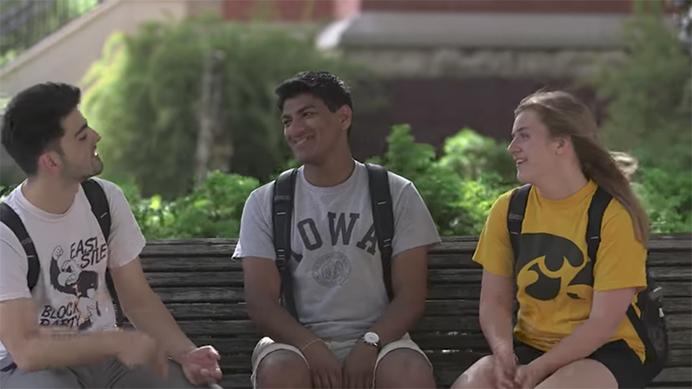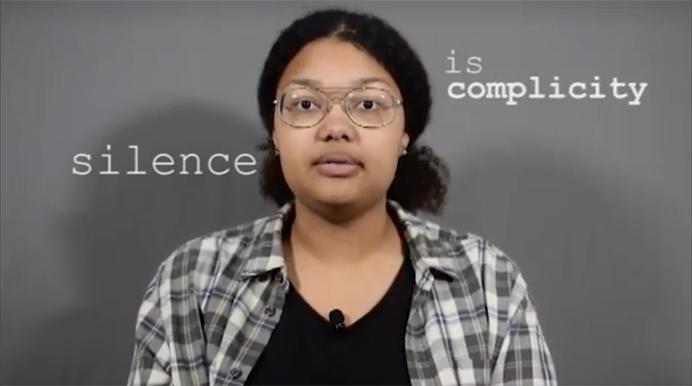Students, not silence, still welcome here
June 20, 2017
After a particularly contentious election cycle in 2016, the University of Iowa community is turning to visual aides to push for a truly inclusive campus.
UI officials say they strive to foster an atmosphere on campus that is accepting and welcoming of students from diverse backgrounds and cultures. Students, however, are making a statement to acknowledge that although the UI is working toward inclusion, in light of last year’s events, the onus is on the entire UI community to play its part in speaking out against discrimination.
Through two contrasting video campaigns, the UI community evaluates the reality of the campus climate surrounding diversity and looks to the ideal it hopes to attain.
You Are Welcome Here
Whether students board a plane and fly overseas or drive an hour across the state to attend the UI, the community wants students to know they are welcome here.
More than 200 universities across the United States have participated in the #YouAreWelcomeHere campaign, using social-media videos and statements to convey the message that their institutions are “diverse, friendly, safe, and committed to student development,” according to the campaign’s website.
Amy Brewster, the UI International Programs assistant director of communications and relations who was part of the creative team behind the making of the video, said in an email to The Daily Iowan that the reaction to the “You Are Welcome Here” video has been positive.
“We have been so pleased with the positive response we’ve gotten from the university and surrounding community,” she said. “Several students, UI departments, and community groups have posted the video to their websites or shared the video through their own social media platforms.”
Iowa City Mayor Jim Throgmorton, UI President Bruce Harreld, and UI Student Government Vice President Lilián Sánchez were a few of the people who appeared in the UI’s #YouAreWelcomeHere video.

Downing Thomas, a UI associate provost and the dean of International Programs, said having important community figures appear in the video sets a standard for others.
“I think it sets the tone and encourages people to think about what kind of community we want here and how welcoming people and learning from people who are different from you can be pleasurable, and it can also help you be a better person and better prepared for life,” he said.
Sánchez said the International Student Scholar Services realized it was a nationwide campaign that the university had not participated in yet and thought it was something that needed to be done at the UI.
“Especially with our campus climate, we wanted to make sure that everyone feels included and welcome,” she said. “… The whole purpose of the campaign and the video is to show that we are diverse on campus. There are various different identities that exist on campus that we sometimes don’t even know sometimes exist, and not only does that enrich our communities, but it brings the perspective that is really only available and unique to Iowa City.”
The campaign comes at a time when universities across the nation, including the UI, are seeing a drop in international-student enrollment. In 2015, international student enrollment at the UI was 4,540. That number fell to 4,300 in 2016, according to the UI International Programs website.
Thomas said this might be in part due to competition among universities to recruit students but also because of concern about coming to the U.S. and feeling welcomed.
“I think this was part of the reason for the message, was with all of the talk of immigration reform and restrictions, we wanted to make it clear that particular students are not part of that,” he said. “No one’s trying to reduce the number of international students in the U.S. It’s illegal immigrations, it’s people who have overstayed their visas … We wanted to make it clear that you are welcome here and that we certainly would like to see a strong number of international applications from a diverse geographical range.”
Silence is Complicity
In the face of discrimination and prejudice, silence is complicity, students say.
UI Student Government collaborated with a diverse group of students to make the video “Silence is Complicity” to call upon the UI community to denounce acts of hate.
UISG Sen. Alex Bare, who led the efforts to create the video, said racially charged incidents that occurred toward the end of the spring 2017 semester inspired the UISG Diversity and Inclusion Committee to respond. The University of Minnesota Student Association released a similar video, he said.
“We decided that this was something that was going to be our responsibility to speak out about,” he said.
At the UI, approximately 18 percent of students are minorities, according to fall 2016 admissions data, which makes the UI a predominantly white institution. Bare said it is important especially for nonminority students attending a predominantly white institution to use their position to call out oppression of underrepresented students.
“The most important thing with this video is that we acknowledge this isn’t a new problem; this isn’t a problem that just spouted up,” he said. “… We wanted to really break the whole notion that these things don’t happen at the University of Iowa.”
Apoorva Raikwar, the head of the UISG Diversity and Inclusion Committee who was one of the people to review the script prior to getting it approved, said it was important that the wording of the script did not dampen the message UISG members felt the video needed to have.
“We passed on the script and showed it to several people … to make sure the wording was right and our message was effectively getting across,” she said. “We were being careful but also not tiptoeing on university administrators’ toes too much; we didn’t want to be too safe … Like the video says, ‘Silence is Complicity,’ so you just really have to speak up.”
UISG Sen. Nate Robinson, the vice president of Alpha Phi Alpha, one of the “Divine Nine” historically black greek organizations, said he also participated in reviewing the script. The conversations with other National Panhellenic fraternities shaped the script and prevented them from “watering down” the message they hoped it would convey, he said.
“We looked at that carefully and [said], ‘You’re right. We need to change this in order for it to have the impact that it needs to have,’ ” he said. “We made sure that it was a little stronger and making sure that we state that we in no way, shape, or form support these kind of acts and just make sure that students feel comfortable and that we’re here to help them.”
UISG President Jacob Simpson said the idea behind his winning Bridge UI campaign with Sánchez was that people need to share experiences and meet each other in a place of vulnerability to better their community.
“Knowing that these stories are real and that these instances happen on campus all of the time will hopefully ensure that students don’t just observe it, but do something about it and don’t become just bystanders,” Sánchez said.
When the UI responds to incidents of discrimination, Robinson said, students want to be informed of what is happening on campus and to be made aware of available resources. Whether the UI releases a statement and no matter who signs it, he said, students just want to know who is in their corner.
“Students … don’t really care initially that the [university] president signed on to this statement and is in support,” he said. “They just want to know and be informed of what’s going on on this campus that is affecting them and that something is being done about it.”



